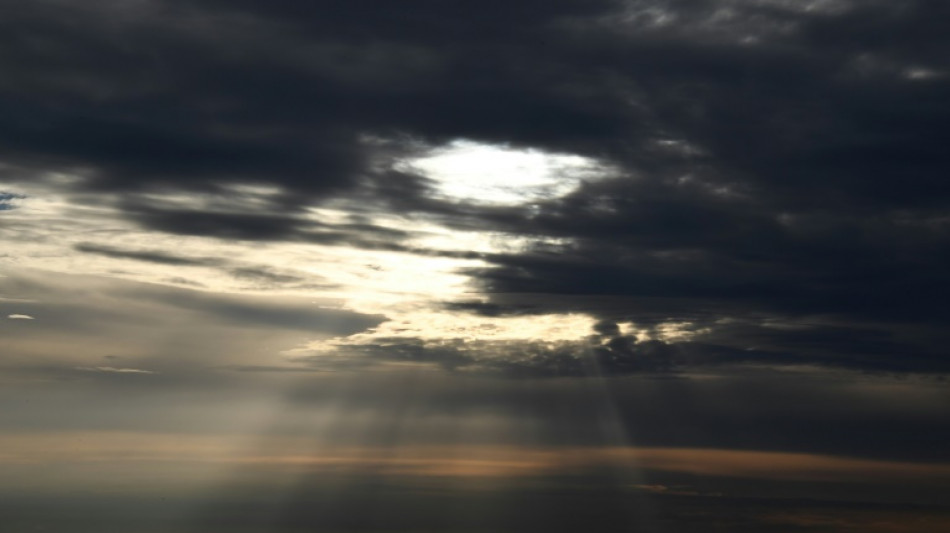
-
 Drones hit US embassy as vengeful Iran targets Mideast cities
Drones hit US embassy as vengeful Iran targets Mideast cities
-
Mideast war exposes fragile oil, gas dependency

-
 How the T20 World Cup semi-finalists shape up
How the T20 World Cup semi-finalists shape up
-
Oil extends gains and stocks dive as Middle East war spreads

-
 Warming El Nino may return later this year: UN
Warming El Nino may return later this year: UN
-
Trump says US-UK relationship 'not like it used to be'

-
 Eight years on, trial begins in Argentina submarine implosion
Eight years on, trial begins in Argentina submarine implosion
-
Beijing votes out three generals from political advisory body

-
 The French village where Ayatollah Khomeini fomented Iran's revolution
The French village where Ayatollah Khomeini fomented Iran's revolution
-
South Africa, India eye T20 World Cup rematch as semi-finals begin

-
 Trump hosts Germany's Merz for talks eclipsed by Mideast war
Trump hosts Germany's Merz for talks eclipsed by Mideast war
-
Second-hand phones surf rising green consumer wave

-
 Pakistanis at remote border describe scramble to leave Iran
Pakistanis at remote border describe scramble to leave Iran
-
China votes to oust three generals from political advisory body

-
 Murray scores 45 as Nuggets hold off Jazz
Murray scores 45 as Nuggets hold off Jazz
-
Five things about the 2026 F1 season

-
 Scrum-half Gibson-Park: Ireland's 'petit general'
Scrum-half Gibson-Park: Ireland's 'petit general'
-
Geopolitical storm leaves isolated Greenlanders hanging by a telecoms thread

-
 Myong hat-trick as North Korea cruise at Women's Asian Cup
Myong hat-trick as North Korea cruise at Women's Asian Cup
-
AI disinformation turns Nepal polls into 'digital battleground'

-
 New Israel, Iran attacks across region: Latest developments in Middle East war
New Israel, Iran attacks across region: Latest developments in Middle East war
-
China's overstretched healthcare looks to AI boom

-
 Oil extends gains and stocks drop as Iran conflict spreads
Oil extends gains and stocks drop as Iran conflict spreads
-
Rituals of resilience: how Afghan women stay sane in their 'cage'

-
 Strait of Hormuz impasse squeezes world shipping
Strait of Hormuz impasse squeezes world shipping
-
Oscar-nominated Iranian doc offers different vision of leadership

-
 Oscar-nominated docs take on hot-button US social issues
Oscar-nominated docs take on hot-button US social issues
-
'I couldn't breathe': The dark side of Bolivia's silver boom

-
 Underground party scene: Israelis celebrate Purim in air raid shelters
Underground party scene: Israelis celebrate Purim in air raid shelters
-
Flowers, music, and soldiers at funeral of drug lord

-
 'Safety and wellbeing' will guide F1 Mideast planning: FIA chief
'Safety and wellbeing' will guide F1 Mideast planning: FIA chief
-
Trump to attend White House Correspondents' dinner

-
 Will Iran's missiles drain US interceptor stocks?
Will Iran's missiles drain US interceptor stocks?
-
The Agentic Era Redefines Customer Intimacy as AI is Set to Become the Primary Brand Interface

-
 MindMaze Therapeutics Provides Corporate Update and Publishes March 2026 Investor Presentation
MindMaze Therapeutics Provides Corporate Update and Publishes March 2026 Investor Presentation
-
InterContinental Hotels Group PLC Announces Transaction in Own Shares - March 03

-
 New eBook Challenges the Popular Narrative That Manifestation Is Always Positive
New eBook Challenges the Popular Narrative That Manifestation Is Always Positive
-
Trump warns of longer Iran war as violence spreads

-
 Energy infrastructure emerges as war target, lifting prices
Energy infrastructure emerges as war target, lifting prices
-
Trump warns of longer Iran war, Rubio points at Israel

-
 US urges to 'depart now' from Middle East: Latest developments in Iran war
US urges to 'depart now' from Middle East: Latest developments in Iran war
-
Ecuador launches joint anti-drug operations with US

-
 Getafe deal flat Real Madrid La Liga title race blow
Getafe deal flat Real Madrid La Liga title race blow
-
Rubio, Hezbollah and Qatar: Latest developments in Iran war

-
 Rubio says Israel's strike plan triggered US attack on Iran
Rubio says Israel's strike plan triggered US attack on Iran
-
'Thank you, madam president': Melania Trump leads UN Security Council as Iran war rages

-
 Bombing Iran, Trump has 'epic fury' but endgame undefined
Bombing Iran, Trump has 'epic fury' but endgame undefined
-
US slaps sanctions on Rwanda military over DR Congo 'violation'

-
 US Congress to debate Trump's war powers
US Congress to debate Trump's war powers
-
US appeals court denies Trump bid to delay tariff refund lawsuits


Unfinished deepsea observatory spots highest-energy neutrino ever
A neutrino with 30 times more energy than any previously seen on Earth was detected by an unfinished observatory at the bottom of the Mediterranean Sea after travelling from beyond this galaxy, scientists said Wednesday.
Neutrinos are the second most abundant particle in the universe. Known as ghost particles, they have no electric charge, almost no mass and effortlessly pass through most matter -- such as our world or bodies -- without anyone noticing.
The most violently explosive events in the universe -- such as a star going supernova, two neutron stars smashing into each other or the almighty suck of supermassive black holes -- create what is called ultra-high-energy neutrinos.
Because these particles interact so little with matter, they glide easily away from the violence that created them, travelling in a straight line across the universe.
When they finally arrive at Earth, neutrinos serve as "special cosmic messengers" offering a glimpse into the far reaches of the cosmos that is otherwise hidden from our view, Italian researcher Rosa Coniglione said in a statement.
However, these ghost particles are extremely difficult to detect. One way is by using water.
When light passes through water, it slows down. This sometimes allows quick-moving particles to overtake light -- while still not going faster than the speed of light.
When this happens, it creates a bluish glow called "Cherenkov light" that can be detected by extraordinarily sensitive sensors.
But to observe this light requires a huge amount of water -- at least one cubic kilometre, the equivalent of 400,000 Olympic swimming pools.
That is why the Cubic Kilometre Neutrino Telescope, or KM3NeT, lies at the bottom of the Mediterranean.
- Think of a ping pong ball -
The European-led facility is still under construction, and spread over two sites. Its ARCA detector, which is interested in astronomy, is nearly 3,500 metres (2.2 miles) underwater off the coast of Sicily.
The neutrino-hunting ORCA detector is in the depths near the French city of Toulon.
Cables hundreds of metres long equipped with photomultipliers -- which amplify miniscule amounts of light -- have been anchored to the seabed nearby. Eventually 200,000 photomultipliers will be arrayed in the abyss.
But the ARCA detector was operating at just a tenth of what will be its eventual power when it spotted something strange on February 13, 2023, according to new research published in the journal Nature.
A muon, which is a heavy electron produced by a neutrino, "crossed the entire detector, inducing signals in more than one-third of the active sensors," according to a statement from KM3NeT, which brings together 350 scientists from institutions in 21 countries.
The neutrino had an estimated energy of 220 petaelectronvolts -- or 220 million billion electron volts.
A neutrino with such a massive amount of energy had never before been observed on Earth.
"It is roughly the energy of a ping pong ball falling from one metre height," Dutch physicist and KM3NeT researcher Aart Heijboer told a press conference.
"But the amazing thing is that all this energy is contained in one single elementary" particle, he added.
For humans to create such a particle would require building the equivalent of a Large Hadron Collider "all around the Earth at the distance of the geostationary satellites", said French physicist Paschal Coyle.
- Blazars as source? -
With this kind of energy, the event that created this neutrino must have been beyond Milky Way.
The exact distance remains unknown, "but what we are quite sure is that it's not coming from our galaxy", said French physicist Damien Dornic.
The astrophysicists have some theories about what could have caused such a neutrino. Among the suspects are 12 blazars -- the incredibly bright cores of galaxies with supermassive black holes.
But more research is needed.
"At the time this event happened, our neutrino alert system was still in development," Heijboer emphasised.
If another neutrino is detected near the end of this year, an alert will be sent in seconds to "all the telescopes around the world so that they can point in that direction" to try to spot the source, he said.
P.Martin--AMWN
